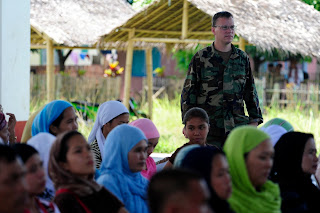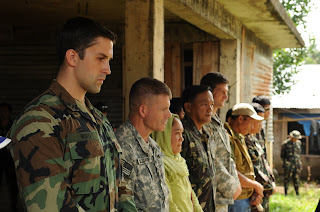In central Mindanao, Civil Affairs Teams 733 and 735, drawn from the Army’s Charlie Company, 97th Civil Affairs Battalion, and Maritime Civil Affairs Team 103, of the Navy’s Maritime Civil Affairs Squadron 1, have been working side by side with their AFP counterparts to identify areas vulnerable to terrorist influence and to deliver humanitarian assistance to the people there.
.jpg) The type of assistance varies, depending on the needs of the population in a particular area. For some villages, the teams might coordinate with the AFP and local agencies to conduct short-term projects such as day-long medical and dental clinics, veterinary projects with local farmers or books distributions at local schools. For other villages, the teams initiate major long-term projects such as construction of roads, wells and schools.
The type of assistance varies, depending on the needs of the population in a particular area. For some villages, the teams might coordinate with the AFP and local agencies to conduct short-term projects such as day-long medical and dental clinics, veterinary projects with local farmers or books distributions at local schools. For other villages, the teams initiate major long-term projects such as construction of roads, wells and schools.
“The Civil Affairs Team is the one that decides on the CA activity, but it is the AFP and the local government units that ‘hold’ the activity,” said U.S. Army Maj. Tad Gilbert, the CA manager for Task Force Mindanao. “Everything is ‘by, through, and with’ them.”
In Mindanao, the patchwork of geography and ethnic groups isolates large portions of the country. Education, medical treatment, and economic prosperity can be hard to come by in areas that can only be accessed through a marsh or across a mountain range. Culture, religion, and even language can change from one valley to the next.
Each CA team is assigned to a particular area of Mindanao, forming relationships with the local governments and the AFP units operating in their area. Because each team only numbers four people, they rely heavily on the networks they establish to help identify the areas most in need of assistance, whether it be a doctor’s visit or a new water well.
“Our area is pretty robust,” said Staff Sgt. Willie Battle, a member of Civil Affairs Team 735. “With a four-man team, it’s a challenge just to cover that area, but working with the AFP makes our lives much easier.”
According to Gilbert, being able to work with established governments and an active military is a real advantage in the Philippines. Whereas many CA missions are conducted in countries where those sorts of institutions have collapsed, the presence of these agencies here means the government is involved in the activities from the start, helping to promote long-term sustainability.
“Sustainability is a major key to our projects,” Gilbert said. “We focus on joint production: the AFP, local government units, and the community all working together to build the project. When they do this, they have a sense of ownership and will take care of it in the future.”
.jpg)
Identifying problems and developing solutions for local populations not only calls for the flexibility to operate in the variety of environments and circumstances, but an ability to see things without American pre-conceptions.
“On a CA team, you have a lot more freedom to interact with the locals and you get a better impression of their views,” said Battle. “Instead of coming at it from a U.S. perspective, you see things as a local. It’s an enlightening experience.”
The sheer scope of possible scenarios the teams are faced day in and day out, from helping plan infrastructure projects to conducting medical clinics for hundreds of people at a time, present great challenges and great opportunities.
“We’re out there on a day-to-day basis in a very unpredictable environment,” said Navy Lt. Joe Wurtz, the team leader of MCAT 103. “We’re meeting with people from the friendliest AFP leader to rebel fighters on the verge of surrender.”
To the CA team members, though, that unpredictability of the environment and the flexibility required to operate in it are part of what makes the job so satisfying.
.JPG)
“I think [this assignment] is the pre-eminent CA mission out there,” said Wurtz. “You’re hitting all aspects of a traditional civil affairs skill set and combining that with unconventional warfare.”
“I’ve had other jobs in the Army,” added Battle, “but you’ll never find anything with this kind of job satisfaction.”



.jpg)

.jpg)


